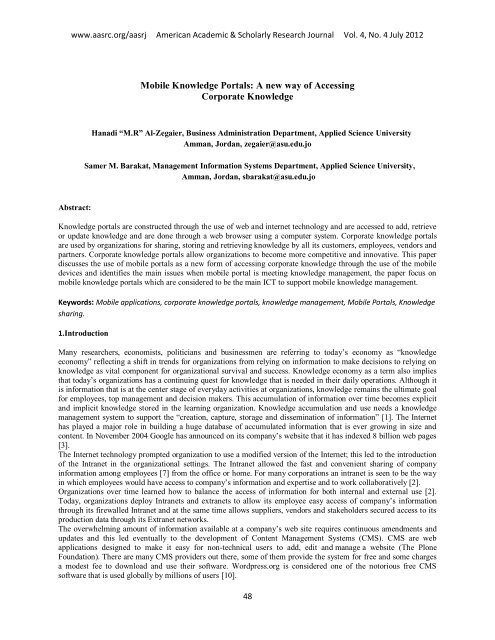E - American Academic & Scholarly Research Center
E - American Academic & Scholarly Research Center
E - American Academic & Scholarly Research Center
You also want an ePaper? Increase the reach of your titles
YUMPU automatically turns print PDFs into web optimized ePapers that Google loves.
www.aasrc.org/aasrj <strong>American</strong> <strong>Academic</strong> & <strong>Scholarly</strong> <strong>Research</strong> Journal Vol. 4, No. 4 July 2012<br />
Abstract:<br />
Mobile Knowledge Portals: A new way of Accessing<br />
Corporate Knowledge<br />
Hanadi “M.R” Al-Zegaier, Business Administration Department, Applied Science University<br />
Amman, Jordan, zegaier@asu.edu.jo<br />
Samer M. Barakat, Management Information Systems Department, Applied Science University,<br />
Amman, Jordan, sbarakat@asu.edu.jo<br />
Knowledge portals are constructed through the use of web and internet technology and are accessed to add, retrieve<br />
or update knowledge and are done through a web browser using a computer system. Corporate knowledge portals<br />
are used by organizations for sharing, storing and retrieving knowledge by all its customers, employees, vendors and<br />
partners. Corporate knowledge portals allow organizations to become more competitive and innovative. This paper<br />
discusses the use of mobile portals as a new form of accessing corporate knowledge through the use of the mobile<br />
devices and identifies the main issues when mobile portal is meeting knowledge management, the paper focus on<br />
mobile knowledge portals which are considered to be the main ICT to support mobile knowledge management.<br />
Keywords: Mobile applications, corporate knowledge portals, knowledge management, Mobile Portals, Knowledge<br />
sharing.<br />
1.Introduction<br />
Many researchers, economists, politicians and businessmen are referring to today’s economy as “ nowledge<br />
economy” reflecting a shift in trends for organi ations from relying on information to ma e decisions to relying on<br />
knowledge as vital component for organizational survival and success. Knowledge economy as a term also implies<br />
that today’s organi ations has a continuing quest for nowledge that is needed in their daily operations. Although it<br />
is information that is at the center stage of everyday activities at organizations, knowledge remains the ultimate goal<br />
for employees, top management and decision makers. This accumulation of information over time becomes explicit<br />
and implicit knowledge stored in the learning organization. Knowledge accumulation and use needs a knowledge<br />
management system to support the “creation, capture, storage and dissemination of information” 1 . The Internet<br />
has played a major role in building a huge database of accumulated information that is ever growing in size and<br />
content. In November 004 oogle has announced on its company’s website that it has indexed billion web pages<br />
[3].<br />
The Internet technology prompted organization to use a modified version of the Internet; this led to the introduction<br />
of the Intranet in the organizational settings. The Intranet allowed the fast and convenient sharing of company<br />
information among employees [7] from the office or home. For many corporations an intranet is seen to be the way<br />
in which employees would have access to company’s information and expertise and to work collaboratively [2].<br />
Organizations over time learned how to balance the access of information for both internal and external use [2].<br />
Today, organizations deploy Intranets and extranets to allow its employee easy access of company’s information<br />
through its firewalled Intranet and at the same time allows suppliers, vendors and stakeholders secured access to its<br />
production data through its Extranet networks.<br />
The overwhelming amount of information available at a company’s web site requires continuous amendments and<br />
updates and this led eventually to the development of Content Management Systems (CMS). CMS are web<br />
applications designed to make it easy for non-technical users to add, edit and manage a website (The Plone<br />
Foundation). There are many CMS providers out there, some of them provide the system for free and some charges<br />
a modest fee to download and use their software. Wordpress.org is considered one of the notorious free CMS<br />
software that is used globally by millions of users [10].<br />
48


